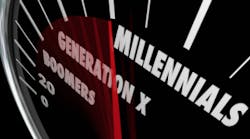What you should know about your millennial dental team members
It's no secret that there are at least three generations working in many dental practices. How can everyone get along? By understanding how the other group thinks.
As you’ve likely noticed, our team members all have their own personalities and working styles, and if you’re not careful that can lead to miscommunication, frustration, and conflict. But if you and your team members understand and embrace these differences, you’ll create a much happier working environment and more productive practice.
Oftentimes the differences you see among employees are generational. I’m willing to bet you have employees from all three generations working in your practice: boomers (1946-1964), gen Xers (1965-1980), and millennials (1981-2000). They all bring their own strengths and weaknesses and their own work philosophies and priorities. Boomers tend to be workaholics who don’t think twice about working weekends and evenings, for example, while gen Xers and millennials value their personal time.
If you take the time to understand each generation and develop solid management strategies, you’ll have the makings of a cohesive team that’s prepared to help your practice succeed. In this article I’ll focus on millennials. Why? These employees are the future of your practice. But I’m guessing you find them difficult to work with at times. They’re probably great employees, they just have a different approach than their more experienced counterparts.
Here are six things you should know about millennial team members, and advice on how you can help them succeed in your practice.
RELATED ARTICLES
3 steps to encourage millennials to pay attention to your dental practice
Employing millennials: How to reduce dental office generational 'turnover'
Millennials are confident
Many of these people were raised by what some might call overprotective parents who constantly told them how wonderful they are. So while they’re team players who want to do their part, most millennials aren’t used to failing. Because of this they tend to be self-assured, even overly confident, so they assume what they’ve done is right and they oftentimes don’t check their work.
This could lead to problems when they’re new, so be sure to offer millennials (and all employees for that matter) the proper training and guidance they need to perform their jobs. That guidance comes in the form of detailed job descriptions, performance measurements, and continual feedback.
They learn quickly
Team members from this generation grew up with technology, and they’re quick to embrace it. They love to take on new challenges and can grasp new concepts quickly. Find out what opportunities excite your millennial employees and try to incorporate them into their responsibilities. Consider sending them to continuing education courses and tradeshows where they can enhance their skills and learn about new technologies.
Millennials want a work/life balance
Personal time is important to millennials, and you won’t usually won’t see them working much past 5 p.m. This can be frustrating to boomers, who spent their working lives putting in extra hours. If you can, offer millennials a flexible schedule that makes it possible for them to have the work/life balance they crave. Millennials tend to work efficiently while they’re in the office. Just remember to hold them accountable.
They won’t hesitate to look for another job
If millennials are unhappy for any reason—whether the schedule isn’t flexible or they don’t feel like they’re earning enough money—they’ll start looking for another job, leaving you to start the dreaded hiring process. That’s why communication from the beginning is so important. Talk with them about their expectations and let them know yours. Give them the direction they need while also taking the time to understand their working style and goals. Trust me, you’ll avoid a lot of frustration and these employees will be much more likely to stick around.
They want feedback
No matter how old your employees are, they want to know what they’re doing right and where they can improve, but I have to say this is especially true with millennials. I suggest you provide all your employees with continual feedback and detailed job descriptions. Make your expectations clear and be sure to outline performance measurements. This will help make every team member more efficient and productive, which will improve your bottom line.
Millennials expect fair compensation
They also expect to be paid the same as more experienced employees and aren’t afraid to ask for a bump in pay. Make sure millennials, as well as everyone else on your team, understand under want circumstances raises will be discussed and how promotions will be awarded.
Building a strong, cohesive team that works well together is key to practice success. To do this, you have to overcome the generational gaps that are part of the workplace. This starts with understanding those differences and doing your part to set up every employee for success. Remember when your team members succeed, so does your practice.
If you need more guidance feel free to contact me at [email protected]. As always, I’m happy to help.








